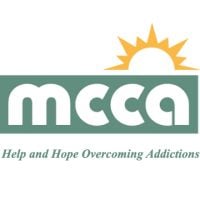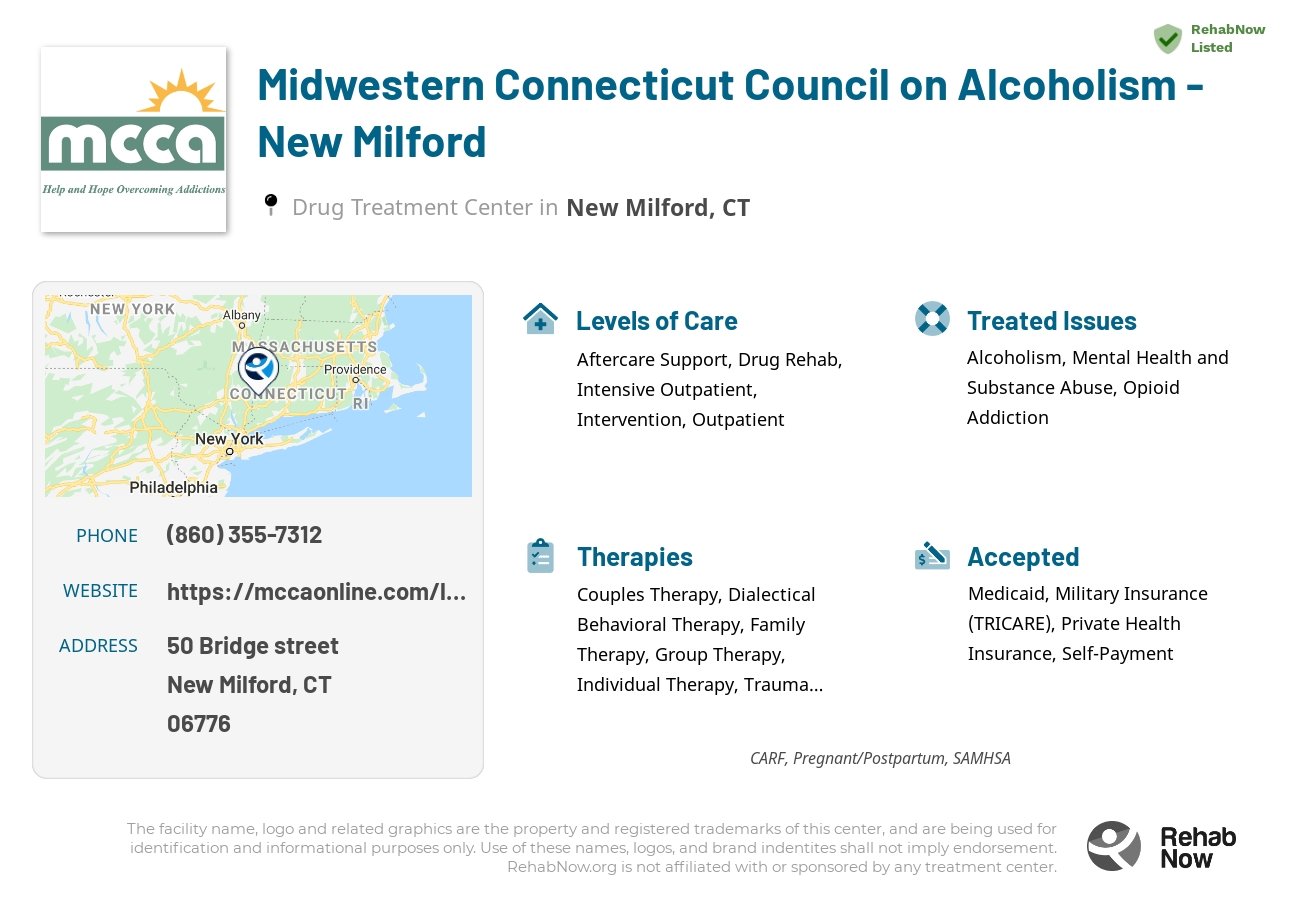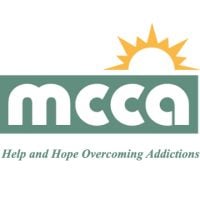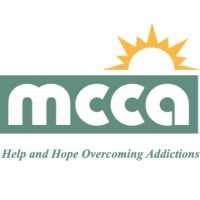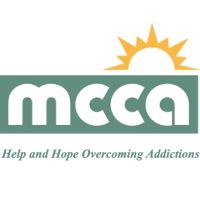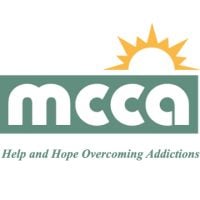Midwestern Connecticut Council on Alcoholism - New Milford
Drug Rehab Center in New Milford, Connecticut
Midwestern Connecticut Council on Alcoholism – New Milford is a drug rehab facility that offers aftercare support, drug rehab, and intensive outpatient treatment to individuals with alcohol, dual diagnosis, opioid, or other drug addictions and is accredited by CARF and SAMHSA. It also accepts private health insurance.
About Midwestern Connecticut Council on Alcoholism - New Milford in Connecticut
Midwestern Connecticut Council on Alcoholism - New Milford is an Addiction Treatment Facility located in New Milford, Connecticut. This facility is accredited by CARF (Commission on Accreditation of Rehabilitation Facilities) and SAMHSA (Substance Abuse and Mental Health Services Administration). They specialize in providing treatment for individuals suffering from alcoholism, dual diagnosis, opioid addiction, and drug addiction. Midwestern Connecticut Council on Alcoholism - New Milford offers a range of services including aftercare support, drug rehab, intensive outpatient programs, intervention services, and outpatient levels of care. They accept private health insurance, ensuring accessibility to those seeking treatment.
Midwestern Connecticut Council on Alcoholism - New Milford prioritizes addressing the various needs of individuals struggling with addiction and substance abuse. They offer comprehensive services for alcoholism, drug addiction, dual diagnosis, and opioid addiction. Their approach includes aftercare support to ensure a smooth transition from treatment back into everyday life. With the availability of drug rehab programs, individuals can receive the necessary treatment and support to overcome their addiction. Additionally, the facility provides intensive outpatient programs for patients who require a more structured treatment plan while maintaining their daily responsibilities. Midwestern Connecticut Council on Alcoholism - New Milford also offers intervention services to assist individuals and their families in addressing addiction effectively. Overall, their commitment to providing a range of services tailored to individual needs makes them a valuable resource in the community.
Genders
Ages
Modality
Additional
Accreditations
SAMHSA

CARF
The Commission on Accreditation of Rehabilitation Facilities (CARF) is a non-profit organization that specifically accredits rehab organizations. Founded in 1966, CARF's, mission is to help service providers like rehab facilities maintain high standards of care.
Conditions and Issues Treated
With so many people addicted to opioids, we need to help those who want to quit. The cycle begins when opioid addicts take opioids for a painful injury. When someone starts taking their medication differently or in excess, it means they’re addicted and at risk of overdosing.
In , detoxing from these types of treatments is the most effective way to beat this. Most facilities begin with medical assistance and then provide counseling services; rehabilitation follows after successful treatment.
Levels of Care Offered
This center offers a variety of custom treatment tailored to individual recovery. Currently available are Aftercare Support, Drug Rehab, Intensive Outpatient, Intervention, Outpatient, with additional therapies available as listed below.
An intensive outpatient program (IOP) is effective for drug rehab, but it can take six months to several years to complete. It’s the most popular type of drug rehab program in the United States. One example of a successful IOP success story is actor and comedian Chris Rock, sober since 1990.
An IOP allows participants to spend nights at home while attending meetings throughout the day. It’s a good way for drug addicts to make a recovery plan in an outpatient setting while still supporting their loved ones.
Alcohol or drug addiction, or co-occurring disorders, are treated in an outpatient program. The patient must attend therapy and other programs at the facility but can return home each night.
Outpatient treatment allows recovering addicts to live at home while receiving addiction treatment. Outpatients can attend group sessions for a few hours per week. Outpatients may also continue to work full time and study/attend school without interruption if they choose.
Intervention services are often the final safety net for individuals struggling with addiction. The process of an intervention starts when family or friends get together to talk about how they think their loved one’s life has been impacted because of addictive behaviors and why treatment is needed for them to move forward into a healthy future. The discussion includes information on what different types of treatments will do, just in case your loved ones agree that this might be necessary at some point during the conversation.
The accomplishment of completing a drug or alcohol treatment program is just the first step. Once that is complete, aftercare support comes into play. This includes helping people adjust to life without substances outside of guidelines with assistance like getting sober living accommodations and career counseling and AA/NA programs for those who are struggling between sobriety or want continued help in maintaining it once they have completed their initial rehabilitation at an addiction facility.
Aftercare comprises services that help recovering addicts readjust to normal day-to-day activities while working on specific issues. These problems include psychiatric issues, family problems caused by substance abuse, continuing education pursuits if desired during rehab, etc. These can last up to one year+ depending on what’s needed most urgently upon completion of earlier stages.
Therapies & Programs
Different people react differently to various treatment options. Some drug rehabilitation centers offer individualized treatment that caters to the specific needs of a drug addict. The best treatment option varies on an individual depending on the type of drug abused, life history, medical condition of the person, social circumstances, and the environment they live in now.
When a person enters drug rehab, they usually have anti-drug associations such as withdrawal symptoms, stress, cravings, etc. The first step of drug rehab is to detoxify the body from any residual substances in it. Drug rehabilitation centers usually employ trained medical professionals to help in this process. Usually, the initial detoxification lasts for five days, where the person is monitored under close supervision.
Couples therapy is a treatment method used to help couples in which at least one member of the couple has a drug addiction. The treatment is designed to help the couple strengthen their relationship to minimize the effects of drug addiction on their lives and promote healthy communication between them.
Couples therapy can be used whether the addicted partner is using drugs or in recovery. It helps the couple create healthy communication and coping skills to minimize the problem-solving abilities of one partner, which can then be directed at solving issues related to their addiction. It also helps couples address problems that may be related to drug addiction. Couples therapy can help couples feel like a team and not feel like their partner is the problem.
Couples therapy is very challenging for both the drug addict and their partner. It requires an intense commitment between the two individuals to participate in the sessions and the homework assigned between sessions.
An additional benefit of couples therapy is that it can help make other types of treatment, such as 12-step programs, more effective.
Family therapy sessions typically involve the addict and their family members. During these sessions, a therapist will work with everyone involved to help them understand addiction and find healthy ways of coping without substance abuse.
Some addicts might feel embarrassed about their substance abuse problems. By encouraging family members to attend these sessions, therapists can show addicts that they’re not alone in dealing with addiction. Therapists can also work with family members to help them understand addiction and learn how to offer support and encouragement to their loved one as they deal with substance abuse issues.
Attending group therapy at Midwestern Connecticut Council on Alcoholism - New Milford in , is a useful way for those seeking sobriety to realize they aren’t the only one going through it.
This is when a group of people on different recovery phases get together and talk about what they’re going through, their triggers, successes, and failures. This can include alternative types of therapies too! Group therapy may occur on an outpatient or inpatient basis with groups that have no pre-existing relationships outside the session, unlike support groups where everyone already knows each other beforehand.
Trauma therapy is a form of therapy used to help people process and understand past traumas. This can help struggling addicts, as many people turn to drugs or alcohol to mask the pain of their past. Trauma therapy can be done in several ways, such as through visualization, discussion, and writing down thoughts and feelings. The goal is to help the individual understand why they are having problems coping with certain situations and changing how they think and react to things. This is often done in tandem with other therapies to treat the underlying issues associated with addiction.
The idea behind trauma therapy is that while some people can experience traumatic events and not have lasting psychiatric symptoms, many others will. In these cases, memories get hidden from consciousness but continue to influence how the person processes and copes with things in their life. They may avoid situations that resemble what happened or become suddenly angry or irritated to a situation that reminds them of a past event. With the help of a therapist, people can go back over memories and experiences. This helps them understand why they are having problems coping with certain situations and changing how they think and react to things.
This type of cognitive-behavioral therapy helps people understand how their thoughts, behaviors, and feelings are interconnected. It can help patients with borderline personality disorder gain control over their actions and stop self-harming thoughts and attempts.
Payment Options Accepted
For specific insurance or payment methods please contact us.
Is your insurance accepted?
Ask an expert, call (888) 674-0062
Midwestern Connecticut Council on Alcoholism Associated Centers
Discover treatment facilities under the same provider.
- MCCA McDonough House and Detox - Danbury in Danbury, CT
- MCCA - New Haven Clinic in New Haven, CT
- MCCA Danbury Outpatient Clinic in Danbury, CT
- MCCA Derby Outpatient Clinic in Derby, CT
- MCCA - Trinity Glen Women's Program in Kent, CT
Learn More About Midwestern Connecticut Council on Alcoholism Centers
Additional Details
Specifics, location, and helpful extra information.
New Milford, Connecticut 6776 Phone Number(860) 355-7312 Meta DetailsUpdated November 25, 2023
Staff Verified
Midwestern Connecticut Council on Alcoholism - New Milford Patient Reviews
There are no reviews yet. Be the first one to write one.
New Milford, Connecticut Addiction Information
Connecticut has a higher rate of substance abuse and addiction than the national average. The state ranks in the top 10 in the country for illicit drug dependence among those ages 18 to 25. In 2010, there were 9,211 people admitted to an alcohol treatment facility for alcohol abuse combined with a secondary drug. Connecticut ranked fifth in the United States of America for the number of fatalities involving drunk driving in 2014.
Treatment in Nearby Cities
- Winsted, CT (29.9 mi.)
- East Canaan, CT (30.9 mi.)
- Brookfield, CT (6.5 mi.)
- Shelton, CT (24.4 mi.)
- New Britain, CT (33.2 mi.)
Centers near Midwestern Connecticut Council on Alcoholism - New Milford
The facility name, logo and brand are the property and registered trademarks of Midwestern Connecticut Council on Alcoholism - New Milford, and are being used for identification and informational purposes only. Use of these names, logos and brands shall not imply endorsement. RehabNow.org is not affiliated with or sponsored by Midwestern Connecticut Council on Alcoholism - New Milford.
